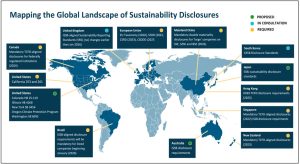Understanding Mandatory Sustainability Disclosures Worldwide
Posted: March 5th, 2025
Authors: James G.
Governments and regulatory bodies worldwide are driving the adoption of standardized reporting frameworks to assure transparent disclosure of environmental, social, and governance (ESG) risks and opportunities. This growing regulatory focus highlights the need for businesses to stay informed, compliant, and proactive in their sustainability strategies and reporting, especially those that operate in countries that may have different requirements than those of the United States (U.S.).
As sustainability disclosure requirements become mandatory in more and more countries, businesses are under increasing pressure to accurately and transparently report on their climate transition plans and decarbonization strategies. Although there has recently been some pullback from making climate-related sustainability disclosures mandatory, countries that have already initiated mandatory sustainability reporting standards have demonstrated that enhanced reporting improves transparency and drives strategic decision-making and long-term value creation.
The Corporate Sustainability Reporting Directive (CSRD) and the International Financial Reporting Standards (IFRS) Sustainability Disclosure Standards are reshaping the landscape of mandatory climate disclosures by setting rigorous requirements for transparency, accountability, and assurance. The CSRD, the European Union’s (EU) legally binding sustainability reporting framework, requires companies to disclose Scope 1, 2, and 3 greenhouse gas (GHG) emissions, climate risk and opportunity assessments, alignment with the EU Taxonomy, and science-based decarbonization targets under the European Sustainability Reporting Standards (ESRS). A key component of the CSRD is its mandatory third-party assurance, verifying that reported sustainability data is auditable and reliable. Meanwhile, the IFRS Sustainability Disclosure Standards, developed by the International Sustainability Standards Board (ISSB), offer a global baseline for corporate sustainability reporting. Although IFRS standards are not legally binding, countries like the United Kingdom (UK), Canada, and Australia are integrating them into financial reporting regulations, reinforcing their global influence. Both the CSRD and IFRS Sustainability Disclosure Standards aim to standardize sustainability reporting, enhance investor confidence, and increase regulatory scrutiny to prevent greenwashing.
Major countries and regions around the world have adopted or are considering mandatory sustainability reporting disclosures. This is particularly significant in the EU which is comprised of 27 countries. The following graphic illustrates the current global landscape of sustainability disclosures, including those already in effect, those proposed, and those under consultation.
Key Regional Developments in Sustainability Disclosures
North America
- United States: The landscape of sustainability disclosures in the U.S. has recently shifted from a federal focus to a more state-level approach. In February 2025, the U.S. Securities and Exchange Commission (SEC) announced it would no longer defend its mandatory climate disclosure rule. Despite this federal shift, individual U.S. states continue to advocate for these types of disclosures. The following section summarizes the state-level initiatives in the U.S.:
- California: Senate Bill (SB) 253, the Climate Corporate Data Accountability Act, and SB 261, the Climate-Related Financial Risk Act, mandate climate-related financial disclosures for large companies operating in the state, driving the sustainability reporting movement.
- New York: SB-3456, the Climate Corporate Data Accountability Act (CCDAA), proposes requiring businesses to report their GHG emissions.
- Colorado: House Bill (HB) 25-1119 requires certain companies to disclose their direct and indirect GHG emissions starting in 2028.
- Oregon: Department of Environmental Quality (DEQ) Administrative Order No. DEQ-18-2024, the Climate Protection Program (CPP), establishes a declining cap on GHG emissions from fossil fuels used in the state, including diesel, gasoline, and natural gas.
- Illinois: HB-4268, the Climate Corporate Accountability Act, requires reporting entities to annually disclose and verify their Scope 1, 2, and 3 emissions to an emissions registry.
- Washington: SB-6092, the Disclosure of GHG Emissions Act, enhances transparency by requiring large businesses to conduct regular, publicly accessible emissions inventories. These inventories must be independently audited and include direct operational emissions as well as emissions from supply chains and raw material processing.
- Canada: In Canada, federally regulated institutions must align with Task Force on Climate-Related Financial Disclosures (TCFD) reporting, which started in 2024.
Europe & the United Kingdom
- European Union: The EU has introduced a suite of regulations for sustainability disclosure, including:
- EU Taxonomy (2020): Applies across all EU member states and impacts financial market participants, large companies, and investors. It establishes a classification system to determine whether economic activity is environmentally sustainable.
- Sustainable Finance Disclosures Regulation (SFDR) (2022): Also applies EU-wide and targets financial market participants (such as asset managers, investment firms, and pension funds). It requires them to disclose sustainability-related risks and impacts in investment decisions.
- The Corporate Sustainability Reporting Directive (CSRD) (2023): Applies in all EU member states, requiring large companies and certain small and medium enterprises (SMEs) to report on ESG matters using ESRS. It replaces the Non-Financial Reporting Directive (NFRD) and extends reporting obligations.
- Corporate Sustainability Due Diligence Directive (CSDDD) (2024): Applies to the entire EU and to some non-EU companies with significant EU business activity. It mandates large companies to conduct human rights and environmental due diligence across their supply chains.
- United Kingdom: By 2026, the UK is implementing the Sustainability Reporting Standards (SRS), which are aligned with the ISSB. Notable developments here include:
- UK-Endorsed IFRS Sustainability Disclosure Standards: Expected in Summer 2025, with consultations on application to listed companies.
- Transition Plans: The UK Transition Plan Taskforce (TPT) has issued recommendations for credible transition planning. Consultations are expected in mid-2025.
- Financial Conduct Authority (FCA) Policy Statement: Extending Sustainability Disclosure Requirements (SDR) and investment labels to portfolio management services (expected Q2 2025).
Asia-Pacific
- China: In mainland China, large companies on the Shanghai Stock Exchange (SSE), the Shenzhen Stock Exchange (SZSE), and the Beijing Stock Exchange (BSE) must conduct double materiality assessments and disclose sustainability data by 2026.
- Hong Kong: In Hong Kong, the Stock Exchange of Hong Kong Limited (HKEX) has implemented mandatory sustainability disclosure requirements that align with the TCFD. These requirements are taking effect in 2025.
- South Korea: The Korea Sustainability Standards Board (KSSB) is developing sustainability disclosure standards for South Korea. The KSSB’s standards are based on the ISSB’s IFRS S1 and IFRS S2 and are intended to promote sustainable economic growth.
- Japan: The Sustainability Standards Board of Japan (SSBJ) has proposed Exposure Drafts of Sustainability Disclosure Standards which are expected to come into effect in Q2 2025.
- Singapore: Since 2022, Singapore has had mandatory sustainability disclosure requirements, with varying degrees of alignment to TCFD and ISSB frameworks.
- Australia: The Australian Accounting Standards Board (AASB) has proposed the AASB S2 Climate-Related Disclosures standard which would require entities to disclose climate-related risks and opportunities that could reasonably be expected to impact their cash flows, access to finance, or cost of capital in the short, medium, or long term. The AASB S2 Climate-Related Disclosures are aligned with ISSB’s IFRS S2 and introduce a phased approach to auditing climate reports.
- New Zealand: New Zealand has mandatory TCFD-aligned sustainability disclosures that went into effect in 2023.
Latin America
- Brazil: Brazil has ISSB-aligned sustainability disclosures that will become mandatory for listed companies starting in early 2026.
Why This All Matters
As the regulatory landscape surrounding mandatory sustainability disclosures continues to evolve, it is crucial for companies, especially multinational corporations, to organize their information to provide transparent insights into their operations. Aligning sustainability disclosures with global standards not only ensures compliance but also enhances investor confidence, corporate reputation, and competitive positioning. With reporting becoming more rigorous worldwide, businesses should proactively integrate robust ESG strategies to stay ahead. These mandatory disclosures, which include detailed reporting on metrics such as GHG emissions, climate risks, and decarbonization strategies, improve corporate transparency, foster informed decision-making, and mitigate risks. Standardized frameworks like the EU’s CSRD harmonize global reporting practices, reduce compliance burdens, and prevent greenwashing through more transparent, auditable, and comparable information. As more jurisdictions adopt these requirements, businesses must adapt to remain compliant, build trust with stakeholders, and position themselves for long-term success in an interconnected global economy.
How ALL4 Can Help
At ALL4, we specialize in guiding businesses through the complexities of sustainability reporting. Our experts are well-versed in global regulations and frameworks, including TCFD, ISSB, CSRD, and emerging regional disclosure standards. We also assist companies in preparing and disclosing climate-related information in response to evolving U.S. regulations, including California’s SB 253, SB 261, and proposed legislation such as New York’s SB 3456. Our tailored consulting services help organizations remain compliant, competitive, and prepared for the future. With ALL4’s support, your company can build a sustainable, resilient future while seamlessly navigating the evolving sustainability disclosure landscape. For inquiries about ALL4’s sustainability services, please contact Managing Consultant James Giannantonio, PMP, LEED AP, at jgiannantonio@all4inc.com.


